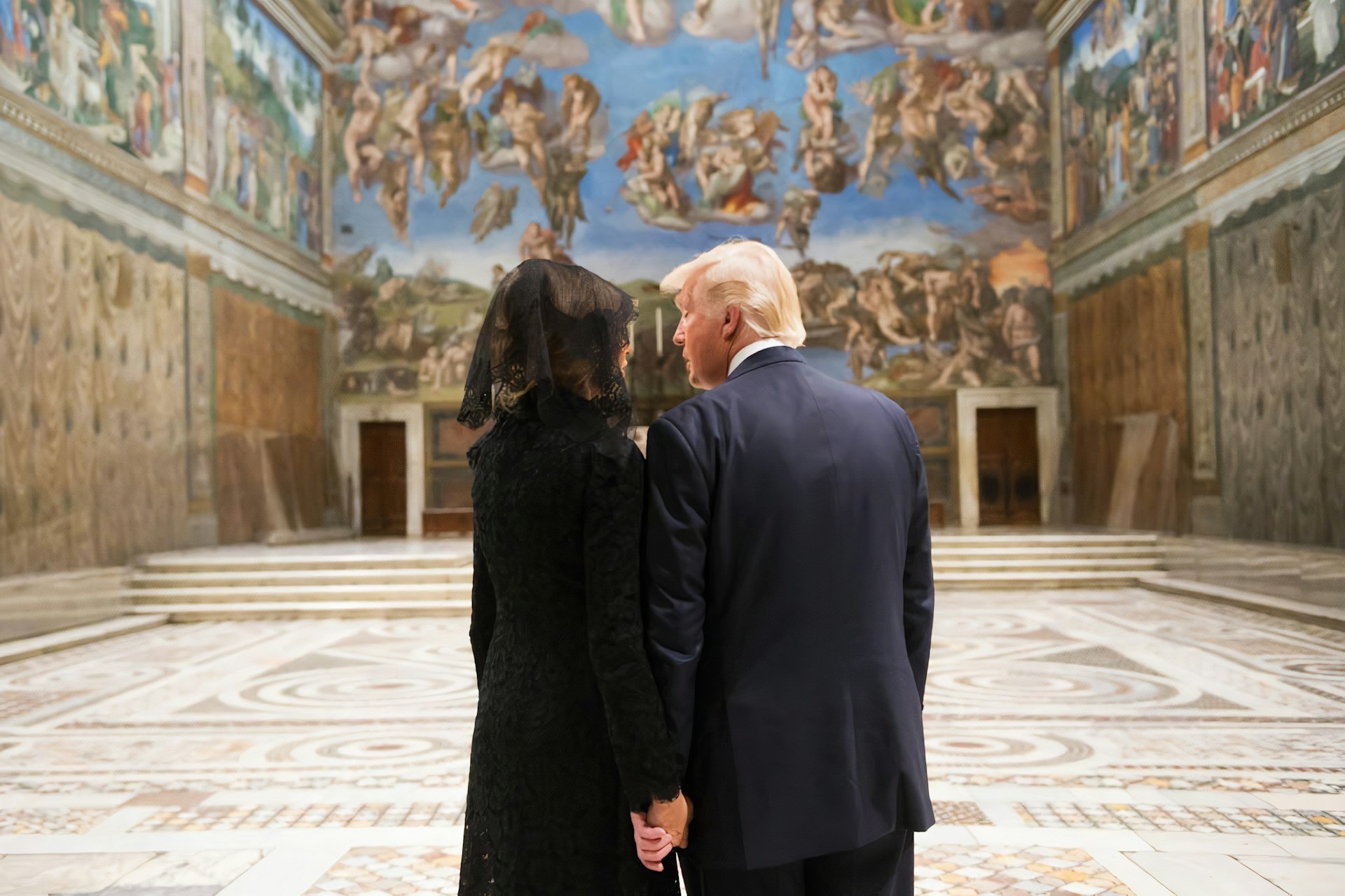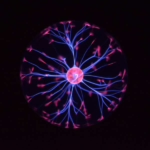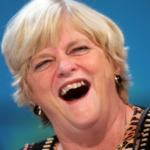
In November, Americans will make a choice between continued democracy with a vote for Joe Biden, or an autocracy infused with Christian fundamentalist values by voting for Donald Trump. Christian nationalism – the belief that a Christian moral perspective must rule the country’s law and institutions – is a stronger force in this year’s presidential election than ever before. And while much of the focus has been on Trump’s alliance with evangelical Christians, there is another group that could be even more influential – and they might just tip the scale in his favour.
Catholic bishops lead the largest single religious group in the country, with 73 million believers, or a fifth of the population (Protestants as a whole make up a larger group but are divided among various denominations). Their influence is important: Catholics vote at a higher rate than most Americans, and since 1952, their votes have usually gone to the winner. Today, Catholic groups are increasingly working in alliance with evangelical groups, to push through laws, make political change, and throw their support behind the Republican party.
One recent example of this alliance was the scrapping of federal protection for abortion in 2022. US bishops celebrated alongside their white evangelical peers when the Supreme Court overturned the 1972 Roe vs Wade ruling. It was the culmination of a decades-long battle waged by both groups, with the election of Trump proving pivotal. Trump had impressed conservative religious voters when he promised to name anti-abortion judges to the Court – and he delivered. On a 2020 phone call with Cardinal Timothy Dolan of New York, who gushed his support, Trump called himself the “best [president] in the history of the Catholic Church”.
Three of the Supreme Court justices who overturned Roe vs Wade were appointed by Trump, bringing the total of judges raised Catholic to seven out of nine. Trump’s principal adviser on the nominations, his “court whisperer”, was Leonard Leo, a daily Mass-goer who controls a network of ultra-right NGOs. Leo has strong links with the US Conference of Catholic Bishops (USCCB), one of the most powerful lobbying groups in the US.
The USCCB’s 274 active members are all men, the vast majority white and beyond middle age. Their Office of Government Relations in Washington is charged with directing activities “to influence the actions of the Congress”. They see their success in removing the constitutional protection for abortion as just one battle in a long war to instill their vision of Catholicism into all aspects of US law and society. Now they are pushing for a national ban that would prevent any woman living in the US from accessing a safe and legal abortion. Some high-profile Catholics have also used the ruling to question other constitutional rights that they believe clash with religious doctrine. In his concurrence with the decision, Justice Clarence Thomas, a Catholic and the longest-serving member of the Court, wrote that it was now time to re-visit past decisions recognising rights to contraception, same-sex marriage, and sexual relations between couples of the same sex. All are forbidden by the Church, and all might be at risk under a second Trump presidency.
Also forbidden by the Church is in-vitro fertilisation (IVF), in which embryos may be frozen and those that are unused or damaged discarded. In 2021, 2.3 per cent of all babies in the US were conceived through the use of assisted reproductive technology, mostly IVF. Recently Alabama’s Supreme Court decided that a frozen embryo had all the constitutional rights of a child, and that to destroy an unused embryo was to commit the crime of “wrongful death.” The issue is certain to reach the US Supreme Court. Meanwhile, the abortion and IVF decisions have caused November elections for state supreme court justices to be among the hottest of the year. Some 80 races are at stake.
Rupture with the Vatican
The USCCB’s obsession with abortion is one of several ways it defies Pope Francis, the Argentine elected in 2013 who has become known for his outreach to the poor and migrants and to people of other faiths, for reforming antiquated Vatican structures, and for deep concern with global warming and the environment. US bishops continue to list abortion as the “pre-eminent” concern when considering candidates for public office, while Pope Francis says one pro-life issue should not take precedence over others – including capital punishment, euthanasia, care for the poor and for all of God’s “creation”.
Francis also argues against politicising faith, urging bishops to be “shepherds” by exercising “closeness, compassion and tenderness”. Yet only a dramatic last-minute intervention from the Vatican prevented the US prelates from forbidding Holy Communion to Joe Biden when he became president in 2021. Biden is a lifelong Catholic, only the second Catholic president in US history, but his defence of pro-abortion law was given as a justification for withholding the sacrament.
How did this divergence come about, between the global Catholic community led by the Vatican, and Catholic bishops in the US? US prelates were not always arch-conservatives. In the early 1980s they stood up against nuclear proliferation and advocated for a just economy that took the poor into account. They also argued against US support for right-wing governments in Central America that were overseeing the slaughter of tens of thousands of unarmed civilians during insurrections. Catholic missionaries were active in the region and reported back to bishops about the crimes they saw; several bishops made their own trips to see for themselves.
By the 1980s, however, traditionalist Catholics were already aligning with white evangelical Christians to make anti-abortion the litmus test for political candidates, and that has linked the bishops ever since to the Republican party. Today, US Catholic bishops and white fundamentalist evangelicals travel the same political path, often back the same issues and candidates, and sound eerily alike in the public arena. More than half of Republican party supporters identify with Christian nationalism. Donald Trump has called himself a nationalist. He is not religious, but opportunistically harnesses conservative Catholic and evangelical support with positions that are friendly to their desire to see their religious views become the law of the land. He calls the Bible “my favourite book”.
The roots of US Christian nationalism
Christian nationalism may have found a leader today in Donald Trump, but its roots can be traced to the 1970s and the work of Paul Weyrich, a pious Catholic operative in Washington. Tremendously energetic and politically savvy, Weyrich felt that the political right was too focused on economics and foreign policy with little to say about the way people led their personal lives. He believed that the founding fathers intended the US to be a Christian nation. Key to this thinking is “American exceptionalism”, the belief that God ordained the country to be unique in the world, morally superior and destined to lead other countries. He would create a “New Right”, and the Republican party would serve as its vessel.
Weyrich knew that Catholics couldn’t hope to achieve this alone. Millions of fundamentalist Christian evangelicals were potentially a giant bloc to harness for the cause. But evangelicals didn’t vote, believing that politics was not part of their calling, and considered abortion a “Catholic issue” about which their leaders were equivocal. Instead, the most important white evangelical political issue of the time was maintaining racial discrimination under the guise of “religious freedom”. When the Supreme Court mandated integration of public schools in 1954, evangelicals began furiously building white-only Christian schools and educational institutes. They fought constantly to evade the law and keep their schools from being taxed or compelled to meet government standards. Weyrich wanted the millions of voters that evangelicals might command for the New Right, but his political acumen told him that racism was not an attractive, broad-based mobilising tool. Abortion, on the other hand, might be.
In 1976, Weyrich traveled to Lynchburg, Virginia, to meet with Jerry Falwell, a popular evangelical leader with an audience of millions for his radio broadcasts and appearances. Falwell shared Weyrich’s view of the un-Christian drift of the country. By sticking together, Weyrich told the famous preacher, evangelicals and conservative Catholics, along with some individual Jews, could turn the tide on the secularisation of society. “Out there is what one might call a moral majority,” Weyrich told him.
Falwell agreed. The “Moral Majority” movement took off. Evangelicals were told it was a sin not to vote. Abortion was the flagship issue. The alliance’s first favoured candidate, Ronald Reagan, signed a pro-abortion law when he was governor of California, but as president (1981–1989), having been elected with the support of Christian nationalists, he railed against it. At a National Prayer Breakfast, he said the answers to “all the problems” known to man could be found in the Bible. The New Religious Right was on the march.
Today, surveys indicate that 20 to 30 per cent of Americans are Christian nationalists or sympathisers, the number rising to two thirds among certain religious groups. During the attempted coup on 6 January 2021, when Trump exhorted loyalists to deny Joe Biden’s electoral victory and march on the Capitol, crosses and Bibles appeared side by side with Confederate flags, nooses and other symbols of white supremacy fundamental to Christian nationalism.
The US Conference of Catholic Bishops has also ridden the wave of culture war issues, often taking similar positions to those of the Republican party. In 2021, following a wave of Black Lives Matter protests, the president of USCCB, Archbishop José Gomez of Los Angeles, called solidarity and social justice movements like BLM “pseudo-religions” and accused them of aiming to replace Christianity. One of the few voices raised against Gomez’s characterisation from within the US Catholic Church belonged to one of its few African American theologians, Rev. Bryan Massingale of Fordham University. Massingale said, “White nationalism is the real idolatrous pseudo-religion that poses a grave threat to both national unity and authentic Christian faith.”
Wealthy patrons
There is plenty of diversity and divergence within the Catholic community in the US. But it’s striking that many of the wealthiest lay Catholics support the agenda of the most conservative bishops. Take as an example Thomas Monaghan, founder of the Domino’s Pizza chain, who told a biographer: “I try to remember that my main job is to become a saint.” To that end Monaghan created Legatus, an influential association of wealthy Catholic corporate CEOs, in 1987. It has been described by Catholic TV network Eternal Word as “a sort of spiritual home-base for those Catholics who stand at the helm of America’s entrepreneurial ship”.
Besides Legatus, Monaghan also created – there is no other way to describe it – an entire Catholic-inspired Florida town, named Ave Maria, with a law school at its heart for grooming the next generation of right-wing lawyers. Its curriculum was partly designed by the late ultraconservative Supreme Court Justice Antonin Scalia, and its dedicatory address delivered by Supreme Court Justice Clarence Thomas.
The pizza king also founded Thomas More Law Center (TMLC), one of several Christian advocacy law firms that “reside at the crossroads of church and state,” as another such firm described itself. “Confronting the threat of radical Islam” is one of TMLC’s declared interests. Cardinal Raymond Burke, a leader among right-wing US bishops and a TMLC endorser, has said that standing against Muslim immigration is “the responsible exercise of one’s patriotism”. This aligns with the policies of Trump, who declared a “Muslim ban” against immigrants from certain countries in one of his first acts as president. The ban was overturned under Biden, but Trump says he wants to bring it back “bigger” if he wins a second presidential term.
A second Trump term is possible, and Catholic lobbyists may help to push the Republicans over the line, exerting both public and more secretive forms of influence. Partnering with Americans for Prosperity, the primary political advocacy group of the billionaire Charles Koch, TMLC won a 2021 case at the Supreme Court that allows charities and non-profit organisations to make use of “dark money” – funds from donors that the organisations are not required to identify. The decision has been a boon for dozens of conservative non-profits – like Catholic pro-life groups – that use politics and the courts to install their version of Christendom.
Other kinds of influence are out in the open. One example is the conservative Heritage Foundation, co-founded by Weyrich. In 1981, the foundation published its first Mandate for Leadership, offering specific policy recommendations for the incoming Ronald Reagan administration. Since then, it has published 10 new mandates, which include lists of recommended political appointees. The current “mandate” for a presumptive Trump administration, called “Project 2025”, calls for reshaping government to give extraordinary powers to the president, replacing thousands of civil service employees with pro-Republican workers, restricting LGBTQ+ rights, eliminating administrative agencies and eviscerating environmental regulations in favour of fossil fuel industries.
Meanwhile, members of the secretive Council for National Policy (CNP), another Weyrich initiative, are strong Trump supporters. They are high-worth individuals from the country’s wealthiest companies and well-connected activists including powerful ultra-right Catholics like Leonard Leo and Ginni Thomas, wife of Justice Clarence Thomas. Echoing Christian nationalists’ message that they are in an existential struggle to create a country of “God’s laws”, as they see them, the CNP’s executive committee chairman once told a pro-Trump donors’ meeting: “This is a spiritual battle we are in. This is good versus evil.”
Catholic bishops and clergy are required to recognise the separation of church and state. It is a principle of the US Constitution and expressly stated in the documents of the landmark Catholic Church council (1962-1965) known as Vatican II. They are not supposed to endorse candidates for public office by name or political movements like Christian nationalism. The nation’s founding fathers specifically recognised no state religion. To virtually create one now, as Christian nationalists want to do, would violate the very ideas – including democracy – on which the country was founded.
But unless they change direction, the bishops along with other ultraconservatives, fuelled by dark money from super-rich donors, may take the US down the perilous road of extremism and autocracy in the coming national elections and beyond.
This article is from New Humanist’s summer 2024 issue. Subscribe now.


